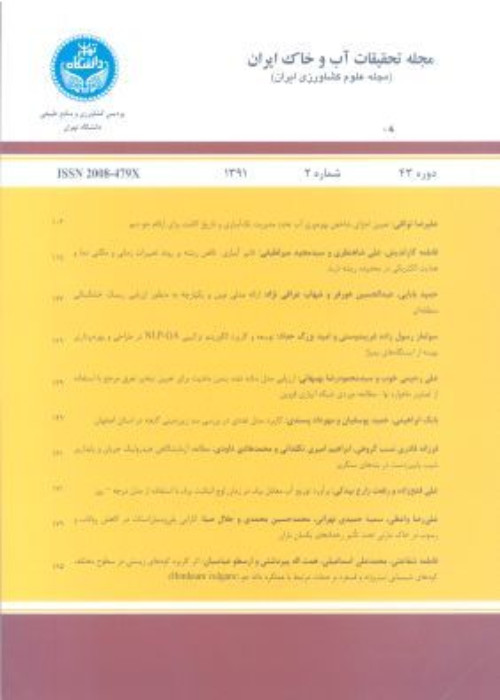The Study of the Phytoremediation Efficiency of Crude Oil Contaminated Soil by Inoculating the Soil with Brachybacterium muris and Pseudomonas putida
Author(s):
Article Type:
Research/Original Article (دارای رتبه معتبر)
Abstract:
Petroleum products are considered to be the most widely used and expensive chemicals in the modern world, but pollution from the extraction and transportation of crude oil has become a global environmental problem. In this experiment, the efficiency of phytoremediation, bioremediation and bio-enhanced phytoremediation in removing crude oil from soil was investigated. For this purpose, a factorial experiment was performed in a completely randomized design with three replications. Factors include three levels of soil oil pollution (zero, 4 and 8% by weight), four plant treatments (without plants, bermudagras (Cynodon dactylon), sorghum (Bicolor Sorghum) and barley (Hordeum vulgare)) and three bacterial treatments (without bacteria). Were native bacteria (Brachybacterium muris) and non-native bacteria (Pseudomonas putida). The results showed that the percentage of crude oil removal by plant cultivation, soil inoculation with bacteria and combined application of plant and bacteria increased significantly compared to the control. Plant culture was more effective than bacterial inoculation in reducing the concentration of petroleum products and the efficiency of bacteria increased significantly with plant culture. At each level of contamination, the highest percentage of oil removal was observed with the combined application of sorghum and Brachybacterium muris. In all plant treatments, the highest oil removal percentage was measured at 4% oil pollution and Brachybacterium muris inoculation. Oil pollution significantly reduced leaf dry weight and chlorophyll concentration, but the use of bacteria (especially native bacteria) significantly reduced the negative effects of oil pollution on plants compared to non-inoculation treatments. Oil pollution increased the proline concentration in the leaves of plants and decreased the proline concentration with the use of native bacteria. Establishment of plant with microorganisms can be considered as a key component of the strategy to remove hydrocarbons. Consequently, these bacterial and plant species can be used for the biodegradation of soils contaminated with crude oil.
Keywords:
Language:
Persian
Published:
Iranian Journal of Soil and Water Research, Volume:53 Issue: 1, 2022
Pages:
171 to 187
magiran.com/p2433113
دانلود و مطالعه متن این مقاله با یکی از روشهای زیر امکان پذیر است:
اشتراک شخصی
با عضویت و پرداخت آنلاین حق اشتراک یکساله به مبلغ 1,390,000ريال میتوانید 70 عنوان مطلب دانلود کنید!
اشتراک سازمانی
به کتابخانه دانشگاه یا محل کار خود پیشنهاد کنید تا اشتراک سازمانی این پایگاه را برای دسترسی نامحدود همه کاربران به متن مطالب تهیه نمایند!
توجه!
- حق عضویت دریافتی صرف حمایت از نشریات عضو و نگهداری، تکمیل و توسعه مگیران میشود.
- پرداخت حق اشتراک و دانلود مقالات اجازه بازنشر آن در سایر رسانههای چاپی و دیجیتال را به کاربر نمیدهد.
In order to view content subscription is required
Personal subscription
Subscribe magiran.com for 70 € euros via PayPal and download 70 articles during a year.
Organization subscription
Please contact us to subscribe your university or library for unlimited access!


